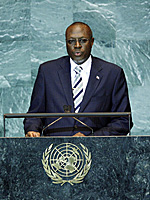Democratic Republic of the Congo
H. E. Mr. Atoki Ileka, Chairperson of the Delegation
29 September 2008
- Video: English | French [RealPlayer - 19 min]
- Statement: French [PDF]
- Back to the list of speakers
Statement Summary

© UN Photo
Click for caption and to enlarge
ILEKA ATOKI (Democratic Republic of the Congo), noting the particularly difficult circumstances posed by the crisis in the global financial system, the rising prices of food and fuel, and the effects of climate change, stressed how acutely those problems were affecting developing countries, and called for urgent, collective and determined action to prevent them from imperilling international peace and security. In addition to the recommendations articulated at the Rome Summit, the Democratic Republic of the Congo called for innovative and urgent action to combat the global food crisis. It also endorsed the World Food Programme’s appeal for additional funds.
He said his country had hosted a conference of the Economic Community of Central African States (ECCAS) in July and was determined to actively uphold the measures devised then. It was also committed to honouring those United Nations Conventions it had signed aimed at combating the effects of climate change, by fighting desertification and protecting biodiversity. As home to 60 per cent of the Congo Basin, the Democratic Republic of the Congo was aware of the role it could play to help combat climate change. It would willingly do so provided the international community played its part by providing due compensation for the environmental benefits provided to humanity by the Congolese forests.
With the promise of a great future, but weakened by years of poor governance, the Democratic Republic of the Congo had risen again as a State, a people and a democracy, he said. Following its successful reunification and subsequent elections, the country had launched efforts for its long-term reconstruction. The improvements it had made, however, must be shored up in light of the dangerous events in the east of the country. Indeed, the actions of the National Congress for People’s Defence (CNDP) had made it impossible for several eastern provinces to enjoy the benefits of peace, security and reconstruction. Recent outbreaks of fighting had led to huge displacements of the population.
Despite progress elsewhere, that group -- in addition to the Forces Démocratiques de Libération du Rwanda (FDLR) -- continued to sow death and destruction, he said. To reverse that trend, the Government was working to mobilize information campaigns to promote disarmament among the Rwandan groups; to encourage their disarmament and voluntary repatriation; and to deploy brigades to act, in concert with forces from the United Nations Organization Mission in the Democratic Republic of the Congo (MONUC). A disengagement plan, drawn up by MONUC, had also been accepted. It would come into force on 1 October and have 45 days to work. The United Nations should provide a clear mandate for MONUC to enforce peace and security as a matter of the Organization’s credibility. Indeed, there was no more legitimate use of force than that by the United Nations.
Beyond the pursuit of peace in the east, the Democratic Republic of the Congo was working to ensure social development, he said, adding that justice was a pillar in that effort. Entire families had been wiped out, mass graves had been found and women and girls had been raped. Given that lingering tragedy, justice was what was most needed. That would mean ending impunity. How else could the rape of women and girls be ended or the abuse of human rights arrested if warlords were not punished. Thus, justice was a foundation for peace -- national justice preferably, but international justice if necessary.
[Source: GA/10758]